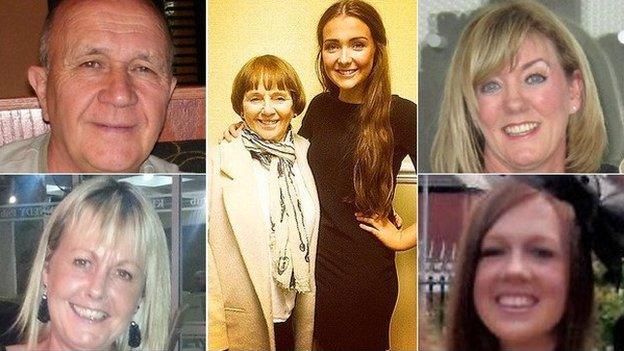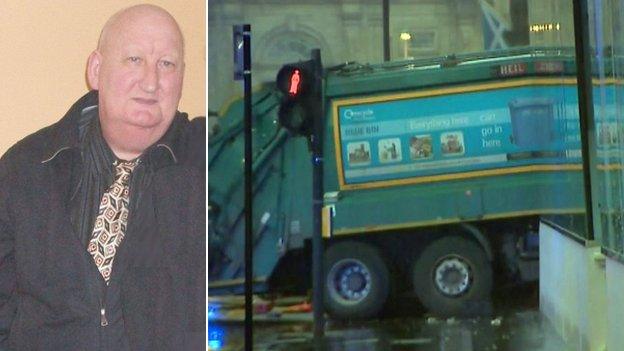Glasgow bin lorry crash: How families could take action against driver
- Published

(Clockwise from top left) Jack Sweeney, Lorraine Sweeney, Erin McQuade, Jacqueline Morton, Stephenie Tait and Gillian Ewing were killed in the crash
The inquiry into the Glasgow bin lorry crash has raised the possibility of the victims' families bringing a private prosecution against driver Harry Clarke. But what is the criteria for such a prosecution and how likely would it be to succeed? BBC Scotland's home affairs correspondent Reevel Alderson reports.
The right for an individual to take out a private prosecution is under Common Law; there is no statutory basis for it.
Normally in Scotland prosecutions are brought by the Lord Advocate, who heads the Crown Office, although some public bodies such as local authorities can bring private prosecutions under statutory law. As an example, this could be against a parent failing to send their child to school.
Non-statutory private prosecutions are extremely unusual, with only two in the 20th Century.
At the Glasgow bin lorry FAI, the Solicitor General Lesley Thomson QC, Scotland's second most senior law officer, described a private prosecution as "a rare and exceptional beast".
To proceed, an individual must request the concurrence (agreement) of the Lord Advocate for a "Bill of Criminal Letters". This procedure at the High Court is effectively an application to the Lord Advocate to support the move - and in most cases he will already have made a decision not to prosecute.
In the two cases which did go ahead in the last century, both had the acquiescence of the Lord Advocate. In 1909 the Crown supported a private prosecution in a fraud case after a civil case had concluded. In 1982 the Crown offered no objection to Carol X, who was bringing a private prosecution in a rape case. Prosecutors had allowed the case to become time-barred.
One of the three accused, Joseph Sweeney, was convicted of rape and jailed for 12 years. The other two defendants were found guilty of indecent assault.

Mr Clarke, who was unconscious when the bin lorry crashed, had a history of fainting and dizzy spells
In the fraud case from 1909, the defendant was found guilty and then admonished.
One of the factors the court must take into account would be if the case being pursued by the private applicant was significantly or substantially different to that considered by the Crown. If it was not, and the applicant was effectively disagreeing with the decision of the Crown, it would be unlikely for the attempt to bring a private prosecution to be successful.
If the court grants the application, the Lord Advocate and the accused have 21 days to lodge answers, after which a hearing is fixed for a later date to decide whether the prosecution can proceed.
There is an over-riding duty on the court, even if the Lord Advocate does not support the application, to rule that in the interests of justice a trial should take place.
At each stage there is the possibility of an appeal, which makes the process extremely costly as legal aid would almost certainly not be available for an individual bringing a case.
However, the Scottish Legal Aid Board said, since there was no precedent, it could not speculate on whether a bin lorry case would attract legal aid.
One criterion would be whether there was a reasonable chance of success in the case. The accused would almost certainly receive legal aid in accordance with ECHR Article 6, the right to a fair trial. In the Carol X case, her lawyers gave their services pro bono - free of charge.
A note of caution: a private prosecution is supposed to be brought by the individual concerned. In the Glasgow bin lorry case six of the victims are deceased, although that objection could surely be overcome. And in any case, theoretically, one of the 15 injured victims could bring a case.
- Published17 August 2015
